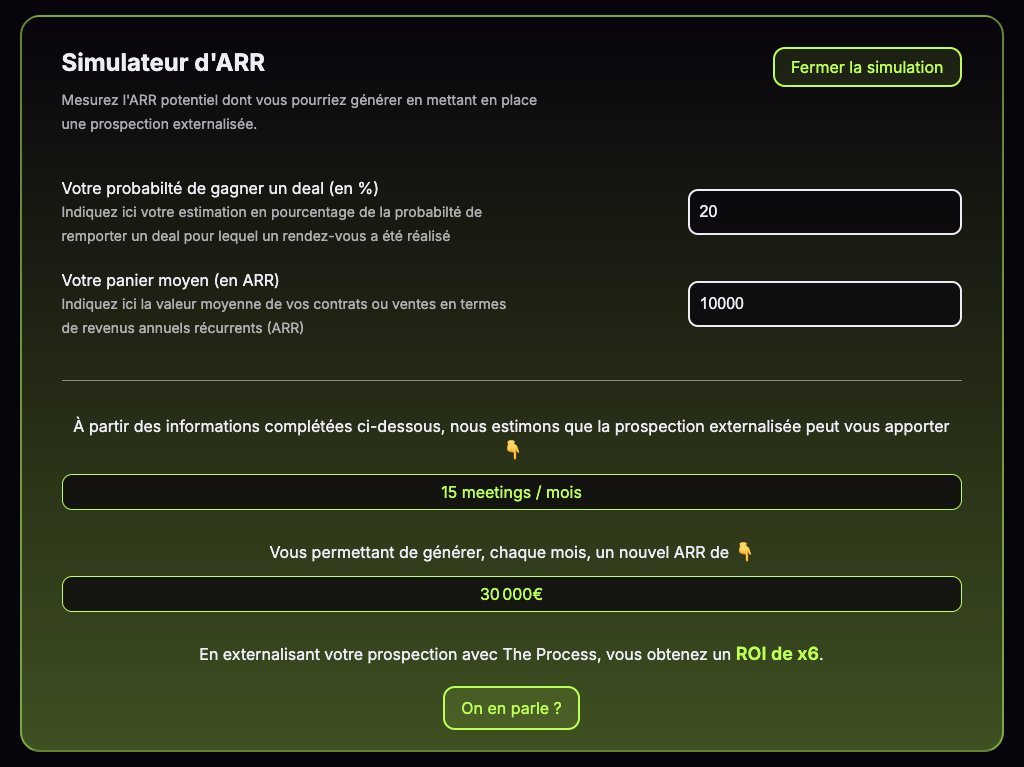
Why delegate your B2B prospecting?
In an increasingly competitive commercial environment where prospecting tools and methods are constantly evolving, B2B prospecting remains a crucial strategic lever for developing your client portfolio. However, without mastering new practices, it can quickly become time-consuming, costly, and complex. In this article, we explain why, when, and how to delegate your B2B prospecting to maximize your ROI.

Florent Horta
Published on 01/10/2025
In an increasingly competitive commercial environment where prospecting tools and methods are constantly evolving, B2B prospecting remains a crucial strategic lever for developing your client portfolio.
However, without mastering new practices, it can quickly become time-consuming, costly, and complex. In this article, we explain why, when, and how to delegate your B2B prospecting to maximize your ROI.
Why delegate your B2B prospecting?
1. Save time
Want to start your prospecting quickly but have limited human and technical resources? Delegating allows you to save valuable time while ensuring effective and high-quality prospecting.
2. Benefit from specialized expertise
Agencies specialized in prospecting master the tools, techniques, and strategies necessary to identify and engage qualified prospects. They stay up-to-date with market trends and best practices.
3. Reduce costs
Recruiting, training, and managing an internal prospecting team can be expensive. Delegating provides access to a complete service, often at a lower cost than an internal team. Since budget is often a critical factor, it's crucial to accurately estimate the expected ROI from delegating. To assist you in this process, you can use our ROI calculator.

ROI Calculator
4. Access the best technologies on the market
Prospecting providers use advanced tools (scraping, automation, data analysis) to maximize campaign effectiveness. By delegating, you benefit from these cutting-edge technologies without having to invest in their acquisition or manage their implementation.
When to delegate your B2B prospecting?
1. During a rapid growth phase
If your company is growing rapidly and you need to acquire new clients quickly to support this momentum, delegating part or all of your prospecting can be a solution. It allows you to accelerate your commercial efforts without wasting time recruiting, training, and structuring internal teams.
2. If your teams lack time or skills
When your salespeople are overwhelmed or do not master specific prospecting techniques (such as writing cold emails or making cold calls), delegating becomes a wise solution.
3. To enter new markets
Planning to enter new countries or market segments but lack the network or expertise to do so? Partnering with an external agency allows you to initiate this process without having to recruit or mobilize your current teams, who can maintain their focus on existing strategic segments. This approach ensures a rapid and effective deployment without disrupting your ongoing operations.
4. If your prospecting performance is stagnating
When your prospecting results begin to wane, delegating can offer a different approach to reignite momentum. Implementing methods or tools previously unexplored can open new opportunities, identify areas for improvement, and infuse new energy into your strategy.
How to delegate your B2B prospecting?
1. Clearly define your objectives
Before selecting a provider, start by precisely identifying your needs: the number of desired leads, target industries, expected qualification level of prospects, etc.
Also, take the time to envision the ideal process for your company, considering aspects such as integration with your CRM, the frequency and content of reports, and interactions with your internal teams.
The clearer your objectives and expectations, the smoother and more effective the collaboration will be.
2. Choose the right partner
Look for an agency with solid experience in your industry and references. Analyze their working methods, tools, and ability to meet your specific needs.
Ensure you can communicate directly with the person managing your account. This conversation will allow you to verify their expertise, understanding of your objectives, and approach to ensuring effective collaboration.
3. Implement an effective onboarding process
Once you've chosen your partner, take the time to organize a comprehensive and structured onboarding. Present your expectations, objectives, value proposition, and priority targets. Provide the provider with all necessary information, such as your sales materials, data on existing clients, and established processes.
Ensure that internal and external teams are aligned to guarantee smooth communication and optimal integration of the provider into your overall strategy. A well-executed onboarding is essential to lay the foundation for a successful collaboration.
4. Collaborate closely
Maintain regular and open communication with the provider to share feedback and refine the strategy over time.
Also, ensure you gather the insights from the field that the provider collects during prospecting. By collecting this information, you enrich your overall strategy. Delegating is about collaboration, not 100% delegation.
5. Measure the results
Use key performance indicators (KPIs) to evaluate the provider's effectiveness, such as conversion rates, cost per lead, or return on investment (ROI).
Focus on business-oriented metrics that truly reflect the impact on your objectives, rather than concentrating solely on superficial statistics like the number of emails sent or open rates.
This monitoring will allow you to optimize your campaigns and adjust your collaboration based on the results obtained.
Conclusion
Delegating your B2B prospecting is not just a practical solution; it's a powerful strategy to boost your company's growth. In an environment where tools, methods, and expectations are constantly evolving, it can be beneficial to rely on experts who can deliver measurable results.
By delegating part or all of your prospecting to a specialized agency, you save time, access specialized skills, benefit from the best technologies, and optimize your costs. This approach also allows your internal teams to stay focused on their key missions while exploring new markets or segments.
However, successfully making this transition requires prior planning: defining clear objectives, choosing the right partner, structuring an effective onboarding process, and collaborating closely to leverage field insights. Finally, measuring results through business-oriented indicators is essential to ensure a good ROI and adjust the strategy if necessary.
Delegating your B2B prospecting is an intelligent investment to drive your development while staying focused on what matters most: customer satisfaction and loyalty. So, ready to take action?
Discover more articles
